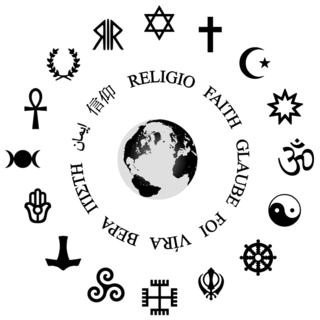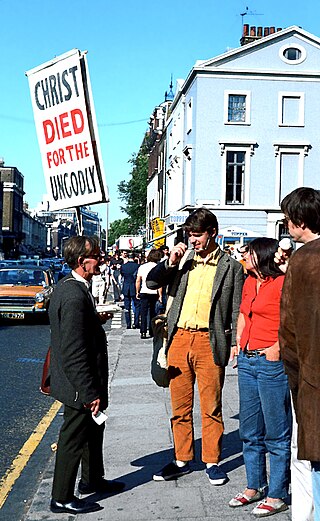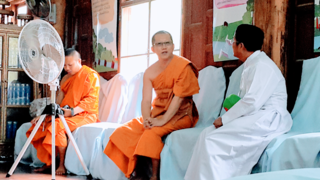
The following outline is provided as an overview of and topical guide to religion:

Religion in Japan is manifested primarily in Shinto and in Buddhism, the two main faiths, which Japanese people often practice simultaneously. According to estimates, as many as 70% of the populace follow Shinto rituals to some degree, worshiping ancestors and spirits at domestic altars and public shrines. An almost equally high number is reported as Buddhist. Syncretic combinations of both, known generally as shinbutsu-shūgō, are common; they represented Japan's dominant religion before the rise of State Shinto in the 19th century.

Comparative religion is the branch of the study of religions with the systematic comparison of the doctrines and practices, themes and impacts of the world's religions. In general the comparative study of religion yields a deeper understanding of the fundamental philosophical concerns of religion such as ethics, metaphysics and the nature and forms of salvation. It also considers and compares the origins and similarities shared between the various religions of the world. Studying such material facilitates a broadened and more sophisticated understanding of human beliefs and practices regarding the sacred, numinous, spiritual and divine.

Proselytism is the policy of attempting to convert people's religious or political beliefs. Carrying out attempts to instill beliefs can be called proselytization.

In the field of comparative religion, many scholars, academics, and religious figures have looked at the relationships between Hinduism and other religions.
Religion in Singapore is characterised by a wide variety of religious beliefs and practices due to its diverse ethnic mix of people originating from various parts of the world. A secular state, Singapore is commonly termed as a "melting pot" or "cultural mosaic " of various religious practices originating from different religions and religious denominations around the world. Most major religious denominations are present in the country, with the Singapore-based Inter-Religious Organisation recognising 10 major religions. A 2014 analysis by the Pew Research Center found Singapore to be the world's most religiously diverse nation.

Buddhism is the second largest religion in Malaysia, after Islam, with 18.7% of Malaysia's population being Buddhist, although some estimates put that figure at 21.6% when combining estimates of numbers of Buddhists with figures for adherents of Chinese religions which incorporate elements of Buddhism. Buddhism in Malaysia is mainly practised by the ethnic Malaysian Chinese, but there are also Malaysian Siamese, Malaysian Sri Lankans and Burmese in Malaysia that practice Buddhism such as Ananda Krishnan and K. Sri Dhammananda and a sizeable population of Malaysian Indians.
The Eastern religions are the religions which originated in East, South and Southeast Asia and thus have dissimilarities with Western, African and Iranian religions. Eastern religions include:
Religion in Hong Kong is characterised by a multi-faith diversity of beliefs and practices.

Religion in Nepal encompasses a wide diversity of groups and beliefs. Nepal is a secular nation and secularism in Nepal under the Interim constitution is defined as "Religious and cultural freedom along with the protection of religion and culture handed down from time immemorial." That is, "The state government is bound for protecting and fostering Hindu religion while maintaining "Religious" and "Cultural" freedom throughout the nation as fundamental rights.

Buddhism's rich history spans over 2,500 years, originating from the Indian subcontinent in the 2nd century AD. Teachings of the Buddha were introduced over time, as a response to brahmanical teachings. Buddhism relies on the continual analysis of the self, rather than being defined by a ritualistic system, or singular set of beliefs. The intersections of Buddhism with other Eastern religions, such as Taoism, Shinto, Hinduism, and Bon illustrate the interconnected ideologies that interplay along the path of enlightenment. Buddhism and eastern religions tend to share the world-view that all sentient beings are subject to a cycle of rebirth that has no clear end.
Asia is the largest and most populous continent and the birthplace of many religions including Buddhism, Christianity, Confucianism, Hinduism, Islam, Jainism, Judaism, Shinto, Sikhism, Taoism, and Zoroastrianism. All major religious traditions are practiced in the region and new forms are constantly emerging. Asia is noted for its diversity of culture. Islam and Hinduisms are the largest religion in Asia with approximately 1.2-1.3 billion adherents each.

Religion in Taiwan is characterised by a diversity of religious beliefs and practices, predominantly those pertaining to the continued preservation of the ancient Chinese culture and religion. Freedom of religion is inscribed in the constitution of the Republic of China (Taiwan). The majority of Taiwanese people practice a combination of Buddhism and Taoism often with a Confucian worldview, which is collectively termed as Chinese folk religion.
The International Association for Religious Freedom (IARF), formerly the International Association for Liberal Christianity and Religious Freedom, is a charitable organization that works for religious freedom around the world. It was founded in Boston, Massachusetts in 1900, and is the oldest international group that promotes dialogue between religions.

Islam is the state religion of Malaysia, as per Article 3 of the Constitution. Meanwhile, other religions can be practised by non-Malay citizens of the country. In addition, per Article 160, one must be Muslim to be considered Malay. As of the 2020 Population and Housing Census, 63.5 percent of the population practices Islam; 18.7 percent Buddhism; 9.1 percent Christianity; 6.1 percent Hinduism; and 2.7 percent other religion or gave no information. The remainder is accounted for by other faiths, including Animism, Folk religion, Sikhism, Baháʼí Faith and other belief systems. The states of Sarawak and Penang and the federal territory of Kuala Lumpur have non-Muslim majorities. Numbers of self-described atheists in Malaysia are few as renouncing Islam is prohibited for Muslims in Malaysia. As such, the actual number of atheists or converts in the country is hard to ascertain out of fear from being ostracised or prosecution. The state has come under criticism from human rights organisations for the government's discrimination against atheists, with some cabinet members saying that "the freedom of religion is not the freedom from religion".
Bhutan is a Buddhist country culturally, socially, politically, and constitutionally, and Buddhism plays a vital role in the cultural and spiritual heritage of the nation.

Buddhism is the predominant religion in Thailand. It is practised by between roughly 90 and 94% of the total population and is deeply influenced by Hinduism. The Thai Constitution does not indicate any state religion, but promotes Buddhism, while guaranteeing religious freedom for all Thai citizens.

According to the 2018 census, Buddhism is the largest religion in Thailand, practiced by over 94% of the population; Islam makes up 5% of the population. The Thai government officially recognizes five religions: Buddhism, Islam, Hinduism, Sikhism, and Christianity.
The Christian Federation of Malaysia is an ecumenical umbrella body in Malaysia that comprises the Council of Churches of Malaysia, National Evangelical Christian Fellowship (Evangelicals) and the Catholic Bishops' Conference of Malaysia. Formed in 1985, the CFM brought together the major expressions of Christianity in Malaysia in a broad-based ecumenical body and a unified voice in dealing with the government as well as other religious and secular bodies in the country.












